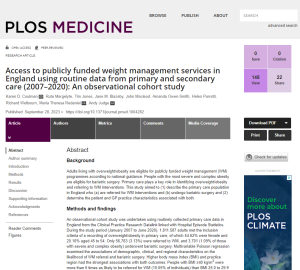Few eligible patients get access to publicly funded weight management programmes in England
28 September 2023
Primary care data on more than 1.8 million adults with overweight or obesity found that only about three per cent were referred to weight management interventions.
Of the more than 1.8 million adults in England with a recorded diagnosis of overweight or obesity, only three per cent are referred to publicly funded weight management programmes, according to a new study publishing in the open access journal PLOS Medicine.
Nearly two-thirds of adults in England live with overweight or obesity, which can affect physical, mental, and social health and wellbeing. According to national guidance, these individuals should be able to access publicly funded weight management programmes, including bariatric surgery for those where weight is having a serious impact on their health.
In the new study, researchers used routinely collected health data to identify 1.81 million adults who had overweight or obesity documented in their primary care record between 2007 and 2020. Only 3.13 per cent of these adults had a weight management referral recorded during the study period. In addition, only 1.09 per cent of the 436,501 adults with severe and complex obesity underwent bariatric surgery.
There were large regional differences in these results. Patients from the West Midlands were more than twice as likely to have a weight management referral than those in the North West, while those from the East of England were half as likely as those in the North West.
Patients from London were more than three times as likely to undergo bariatric surgery as those in the North West. Patients who had been diagnosed with severe and complex obesity for the longest, or who had the greatest number of comorbidities were most likely to receive bariatric surgery.
Dr Karen Coulman, the study’s lead author and a Research Fellow at Bristol Medical School, said:
“This study suggests that access to weight management interventions in England needs improvement. Little has changed over the past decade, yet obesity rates rise. There are marked regional differences in access to weight management programmes including surgery: attention and investment are needed.”
Paper
